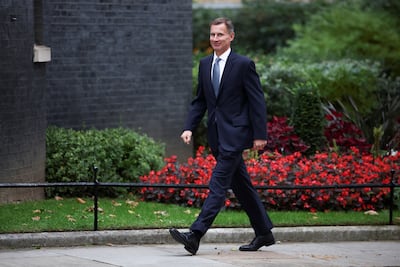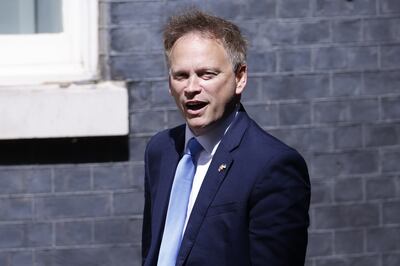Two Conservative Party candidates are seeking to replace Boris Johnson as party leader and prime minster, and lead the country as it tackles a set of crises that includes war in Ukraine and rising inflation.
Former chancellor Rishi Sunak and Foreign Secretary Liz Truss will go head-to-head in a leadership contest after each securing enough backing from MPs. They will now have to seek support among nationwide party members to become the winner.
Suella Braverman, Tom Tugendhat, Kemi Badenoch and Penny Morduant all dropped out of the race after failing to gain enough votes from their parliamentary peers.
Mr Johnson, the departing Prime Minister, wanted to stay in place until October but there was a backlash against him holding on in Downing Street until then, and now a replacement is expected to be in position by September 5.
How does the election work?
The first election rounds involve only the Conservative Parliamentary Party before a final run-off vote involving the vast majority of party members.
The Conservative backbench 1922 Committee set a timetable for the first rounds of the contest. At least eight MPs' nominations were required for any candidate to enter the first round.
The next hurdle was to secure 30 votes from MPs in the first round of a series of ballots among MPs.
Contenders who did not have the support of 10 per cent of the parliamentary party’s 358 MPs had to bow out.
In the next rounds of voting, the candidate placed last in each vote was removed from the contest.
Once the final pair was picked by MPs, the vote opens up to all Conservative Party members. Before the winner is decided in a final ballot, a series of debates and election events will be held around the country.
Contenders
Rishi Sunak

Rishi Sunak was elevated from a junior role to No 11 Downing Street in early 2020, after Sajid Javid's resignation over policy differences with Boris Johnson.
After Covid-19 struck, Mr Sunak stepped to the fore of the government's pandemic response with measures to support workers and businesses.
With a slick social media campaign backed by graphics, he had soon created a personal brand and led the rankings for a future leadership bid.
Mr Sunak was elected in 2015 in the seat of Richmond in North Yorkshire, but his reputation was recently tarnished by a fine in the “Partygate” scandal.
Liz Truss

Liz Truss held positions under David Cameron and Theresa May before being appointed by Mr Johnson, and is the longest continuously serving member of the Cabinet.
A burst of favourable headlines, such as “Liz Truss: the new Iron Lady?” surrounded the Foreign Secretary this year.
Like Margaret Thatcher, the Conservative prime minister from 1979 to 1990, Ms Truss has a deep interest in economic reform and supports right-wing policies to free up the economy and lower taxes.
Her former backing for the Remain campaign to stay in the European Union is still a handicap for her ambitions.
Ms Truss announced her bid to become Tory leader on Sunday evening, pledging to reverse the national insurance increase and “keep corporation tax competitive”.
Candidates knocked out:
Penny Mordaunt

International Trade Minister Penny Mordaunt, in announcing that she would run for the top job, said the UK’s leadership “needs to become a little less about the leader and a lot more about the ship”.
Ms Mordaunt, 49, a former Royal Navy reservist who has also held several senior ministerial roles, is not among the front-runners to succeed Mr Johnson in recent polls of Tory party members ultimately set to choose their new leader.
But such contests are notoriously unpredictable, and with a range of politicians from different factions of the ruling party possibly set to run, political commentators say few contenders can be discounted.
Kemi Badenoch

A former equalities minister, she put herself forward as a candidate to become the new Conservative leader, promising “limited government” and “a focus on the essentials”.
The MP said she supports lower taxes “to boost growth and productivity, and accompanied by tight spending discipline”.
Writing in The Times, she hit out at “identity politics” and said Boris Johnson was “a symptom of the problems we face, not the cause of them”.
“People are exhausted by platitudes and empty rhetoric. Loving our country, our people or our party is not enough,” she said.
Tom Tugendhat

Tom Tugendhat, a former soldier and civil servant, took a leading role as a critic of the government's handling of the Afghanistan crisis.
A “One Nation” Conservative, Mr Tugendhat said it would be a “huge privilege” to serve as prime minister. He has said he will “go for it” if fellow Tories give him their backing to join the race.
Although lacking ministerial experience, Mr Tugendhat's role as a close military and security adviser to the UK high command a decade ago could be seen as preparation for the job.
Suella Braverman

Ms Braverman is the Attorney General for England and Wales. She was a Brexit-supporting MP and is considered to be on the right of the party.
She is the MP for Fareham in 2015 and was appointed to her current post in February 2020.
She is the daughter of Christie and Uma Fernandes, from Kenya and Mauritius, who emigrated to Britain in the 1960s.
Nadhim Zahawi

Nadhim Zahawi was born in Iraq in 1967 in the year the Baath political party regained power. He came from a relatively prominent Kurdish family whose grandfather had been the governor of the Central Bank of Iraq.
After fleeing as a refugee to the UK, he faced difficulties adapting to his life, especially his struggles with the English language and bullies at school.
After a successful career in business, including a role in launching the polling agency YouGov, he entered politics and became MP for Stratford-upon-Avon, William Shakespeare's birthplace.
As a minister he rose from junior roles, including being in charge of the vaccines brief during the Covid-19 pandemic, to be named education secretary.
Mr Zahawi moved into Downing Street as the Chancellor of the Exchequer two days before Mr Johnson's resignation.
Jeremy Hunt

Jeremy Hunt lost out in the 2019 Conservative leadership contest, as Mr Johnson's vow to leave the EU without a deal led to 66 per cent of the vote. Mr Johnson promptly sacked Mr Hunt as foreign secretary.
The entrepreneur and long-time UK health secretary has used his position as chairman of a select committee to keep his profile high.
He has refused to rule out another run at the leadership, taking a hostile stand against Mr Johnson in the confidence vote on his leadership last month.
Even aside from his credentials, one of his strengths as a candidate would stem from not being tainted by being part of Mr Johnson's Cabinet.
Grant Shapps

Transport Secretary Grant Shapps also set out his stance for lower taxes in a Sunday morning television appearance.
People are far more interested in “bread and butter issues” like the cost of living than a debate about trans rights, Grant Shapps has said.
The Conservative leadership candidate said the UK does not “need to get caught up” in a culture war on the issue.
Asked if voters are interested in a so-called war on woke, Mr Shapps said: “If people want a PM who’s talking about woke issues at all, it’s just not me, don’t vote for me.
“I am interested in the bread and butter issues that your viewers will be thinking about every single day of the week.
“I am a libertarian, I’m liberal both economically but also socially. Let’s let live. Let people live their lives.
“I just don’t think we need to get caught up in some US-style debate and sort of almost aggressive war on these issues. It’s just not necessary.”
Sajid Javid

Announcing his bid in The Sunday Telegraph, Mr Javid and Mr Hunt vowed to cut corporation tax from 25 to 15 per cent.
Mr Javid said he would also slash or change other taxes, including reversing a recent rise in national insurance that was aimed at raising health service funding.
“We cannot fall into a low-growth trap like many other countries have across Europe — we must cut taxes,” he told the BBC on Sunday.
Mr Javid also said the UK should consider ripping up old EU laws “to make us a more pro-business, wealth-creating, entrepreneurial economy”.
Rehman Chishti
Newly-appointed Foreign Office minister Rehman Chishti, in announcing that he was running to be the next Tory leader, said on Twitter: “For me it’s about aspirational conservatism, fresh ideas, fresh team for a fresh start taking our great country forward.”


